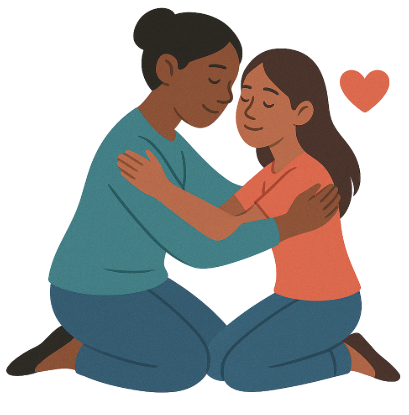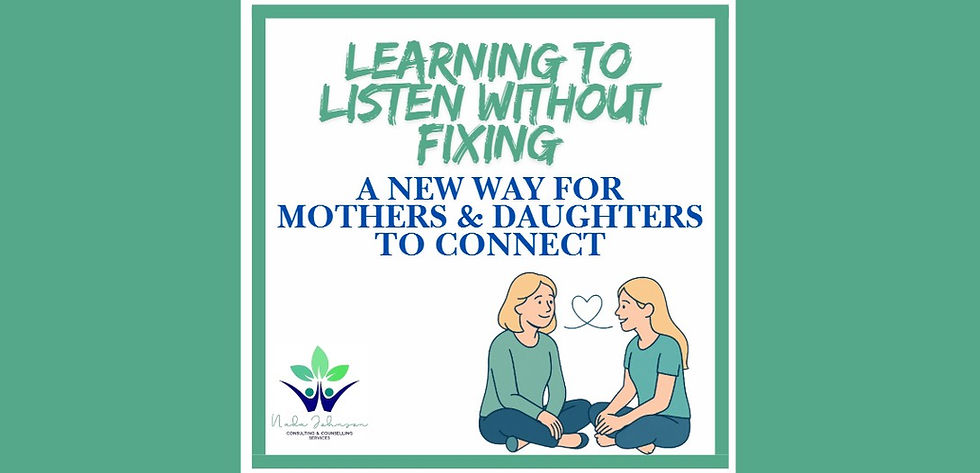Apologizing as a Mother: How Owning Past Mistakes Can Transform Your Relationship
- Nada Johnson

- Sep 11, 2025
- 3 min read
When Silence Becomes a Wall

For many mothers, it can feel easier to move forward and avoid revisiting past mistakes, whether it’s moments of anger, times you weren’t emotionally present, or words you wish you could take back. But unspoken regrets often create quiet walls in the mother–child relationship.
For daughters, those unaddressed moments can linger, shaping how safe or connected they feel with their mothers. A simple but powerful step, apologizing can begin to heal those invisible wounds.
The Power of a Mother’s Apology
Apologizing doesn’t diminish your role as a parent, it deepens it. Research shows that genuine apologies rebuild trust and model emotional responsibility for children (Schumann & Dweck, 2014). When mothers acknowledge past missteps, they send a vital message: “Our relationship matters more than my pride.”
By owning mistakes, mothers create opportunities for:

💙 Healing old hurts – Apologies validate daughters’ experiences and release lingering pain.
💙 Modelling accountability – Children learn how to repair relationships by watching their parents.
💙 Strengthening trust – Vulnerability fosters closeness and safety in the relationship.
💙 Inviting openness – Daughters feel more comfortable sharing their struggles when they know imperfection is accepted.
Common Moments Mothers Regret
Every mother–daughter relationship has tension points, but certain patterns often bring regret:

➡️ Harsh words in conflict – Moments of yelling or criticism that left lasting hurt.
➡️ Emotional absence – Times when stress or overwhelm made it hard to be fully present.
➡️ Over-control – Pushing decisions or paths without leaving room for the daughter’s voice.
➡️ Unmet needs – When a daughter felt unseen, even if the mother had good intentions.
Acknowledging these moments, instead of denying them, is the first step toward repair.
What an Apology Can Sound Like
Apologizing doesn’t require long speeches—it requires sincerity. It might sound like:

🌿 “I realize I wasn’t always present when you needed me, and I’m sorry. You deserved more.”
🌿 “When I raised my voice, I know it hurt you. I regret that and I’m working to do better.”
🌿 “I pushed my ideas on you instead of listening. I want to honor your choices more moving forward.”
These words don’t erase the past, but they create a pathway toward healing in the present.
NJCCS Is Here for You
At NJCCS, I support mothers and daughters in healing the past while building healthier patterns of connection. In therapy, we work on:
🌿 Exploring unspoken hurts with compassion and care
🌿 Practicing repair through apology and accountability
🌿 Rebuilding trust through consistent emotional presence
🌿 Creating a new story for your relationship moving forward
You don’t have to carry the weight of unspoken regrets. Healing is possible—and it begins with one brave word: “I’m sorry.”
With warmth,

Nada Johnson, MSW, RSW
Registered Social Worker, Psychotherapist / trained Family Mediator / EMDR Trained Therapist / Certified Racial Trauma Clinician / Mental Health & Sexual Violence Consultant / Professional Speaker

🌍 Website: www.nadajohnsonservices.com
📩 Contact: info@nadajohnsonservices.com
Nada Johnson Consulting & Counselling Services – Online phone and video sessions available
Village Healing Centre: 240 Roncesvalles Avenue
Follow our platforms for empowering content, mental health support, and resources on building stronger mother–daughter relationships. Please share this post to support other families learning how to listen without fixing—because every daughter deserves to feel heard, and every mother deserves space to connect with love. 🤝
References
Schumann, K., & Dweck, C. S. (2014). Who accepts responsibility for their transgressions? Personality and Social Psychology Bulletin, 40(2), 159–171. https://doi.org/10.1177/0146167213508791
Gordon, T. (2000). Parent Effectiveness Training: The Proven Program for Raising Responsible Children. New York: Harmony Books.
Rogers, C. R. (1957). The necessary and sufficient conditions of therapeutic personality change. Journal of Consulting Psychology, 21(2), 95–103. https://doi.org/10.1037/h0045357
Katz, C., & Hamama, L. (2013). Listen and you will hear: Listening to young children’s voices in child maltreatment assessment. Child Abuse & Neglect, 37(12), 1149–1157. https://doi.org/10.1016/j.chiabu.2013.04.010

Want More Support for Your Professional & Personal Growth?
🔷Try Potential Unlocked™🔷
In addition to counselling, NJCCS offers coaching through our sister brand, Potential Unlocked™, designed specifically for professional women navigating career, leadership, and life transitions.
We support clients with:
Communication and conflict strategy in the workplace
Career development and leadership coaching
Navigating workplace dynamics and burnout recovery
Building confidence in both personal and professional relationships (Online dating empowerment coaching, because personal growth impacts professional life too!)
👉 Visit www.potentialunlocked.ca to learn more or book a free 10-minute consultation call.




Comments